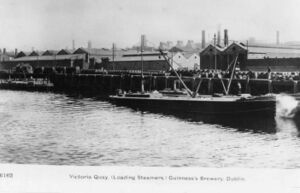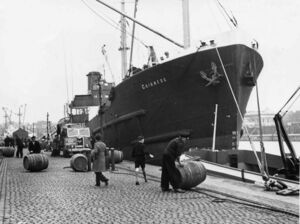A New Ship for Guinness
From THE BREWING TRADE REVIEW FEBRUARY 1962
NEW SHIP FOR GUINNESS
A contract was signed recently at the Guinness Dublin brewery for the building off a ship for the Guinness fleet which moves Dublin-brewed stout to Liverpool and Manchester, and takes back empty containers. The builders will be Charles Hill and Sons Ltd. of Bristol and the new ship will be a single screw motor vessel of approximately the same gross tonnage as the M.V.s The Lady Grania and The Lady Gwendolen which, with the SS Guinness, form the present fleet.
It has been necessary in recent years to charter a ship at Christmas and at other peak traffic periods to assist in carrying the large cargoes of Guinness (almost 60 per cent. of the Dublin output) and lately also of Harp Lager brewed at Dundalk.
The new ship will be of approximately 1,200 tons gross, length overall 213 feet, breadth moulded 36 1/2 feet and mean draught 12 feet 6 inches. She will be different in appearance to the existing Guinness motor vessels: the bridge and officers' accommodation will be aft, instead of amidships, and instead of the six winches and derricks with which each of the present ships is equipped, she will have two electric cranes giving more reliable loading facilities.
For approximately the same tonnage the new ship will carry 25 per cent. more cargo - in the form of transportable tanks. This increase in capacity will be achieved by the siting of the bridge and accommodation aft, and by increasing the width of the beam by 18 inches.
Thus, she will take 281 transportable tanks in her two holds, against the 227 tanks of The Lady Grania or The Lady Gwendolen. More powerful British Polar diesel engines will enable her to maintain the same service speed of 11 knots with the larger cargo. With seven cylinders instead of six, they will develop 1,210 brake horsepower at 270 revolutions per minute.
Navigational aids will be similar to those of the present ships, including Decca radar, radio telephone, V.H.F. radio and echo-sounding gear.
The builders, Charles Hill and Sons Ltd. of Bristol, are an old established ship-building firm of high reputation, founded in 1760, only one year after the first Arthur Guinness had bought his brewery in Dublin.
The barge Killiney loaded with barrels



